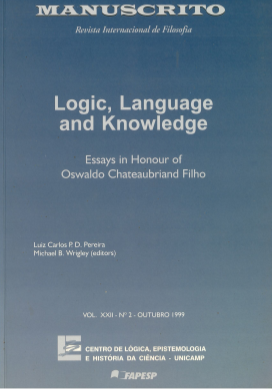Resumo
The widely endorsed idea that science is (or ought to be) value free is best articulated as compounded of there views: “impartiality” (a view about the grounds for accepting and applying theories), “neutrality” (about the consequences of accepting and applying theories), and “autonomy” (about the conduct of scientific practices and the character of scientific institutions). I will presente statements of these these three views (following my recently published: Is Science Value Free? Values and Scientific Understanding). Then, I will argue that, while autonomy cannot be soundly defended and that neutrality is normally lacking, impartiality should be upheld as a valid ideal of scientific parctice. Social and moral values do indeed play a central role in scientific practice at the moment of adoption of research “strategies”, where theories are constrained and empirical data selected, but not at the momento f concrete choice of theory, where impartiality should not be by-passed. This permits that there be a variety of strategies, each of which reflects a diferente value commitment, under which theories may be generated and eventually impartially accepted, and that it can be legitimate to raise questions, at the center of scientific practice, about the role (and possible roles) of Science in serving human well-bering.
Referências
Altieri, M.A. (1987). Agroecology: the Scientific Basis of Alternative Agricultures (Boulder, CO: Westwien Press).
Altieri, M.A. (1990). Why study traditional agriculture? in Carroll, Vandemeer & Rossett (1990), pp. 551-564.
Anderson, E.S. (1995). Knowledge human interests and objectivity in feminist epistemology, Philosophical Topics, 23, pp. 27-58.
Bacon, F. (1620/1960) The New Organon and Related Writings (Indianapolis, Bobbs-Merrill).
Carroll, C.R., Vandemeer, J.H. & Rosset P.M. (eds.) (1990). Agroecology (New York, McGraw Hill).
Cupani, A. (1998). A propósito do ‘ethos’ da ciência, Episteme, 3,pp. 16-38.
Delgado, F. (1992). La Agroecología em Las Estrategias del Desarrollo Rural (Cusco, Centro de Estudios Regionales Andines Bartolomé de las Casas).
Delgado, F. et la. (1990). Agroecologia y Saber Andino (Cochabamba, AGRUCO-PRATEC).
Dupré, J. (1993). The Disorder of Things: Metaphysical Foundations of the Disunity of Science (Cambridge, Havard University Press).
Keller, E.F. (1982). Feminism and Science, Signs: Journal of Women in Culture and Society, 7, pp. 589-602.
Kitcher, P. (1997). The Lives to Come: the Genetic Revolution and Human Possibilities (New York, A Touchstone Book).
Kitcher, P. (1998). A plea for Science studies, in Koertge (1998), pp. 32-56.
Koertge, N. (1998).A House Built on Sand : Exposing Postmodernist Myths About Science ( New York, Oxford University Press).
Kuhn, T.S. (1970). The Structure of Scientific Revolutions second edition (Chicago, University of Chicago Press).
Kuhn, T.S. (1977). Objectivity, value judgment and theory choice, in Kuhn, The Essential Tesion (Chicago, University of Chicago Press).
Lacey, H. (1997a). Neutrality in the social sciences: on Bhaskar’s argument fo na essential emancipatory impulse in the social sciences, Journal for the Theory of Social Behavior, 27 pp. 213-241.
Lacey, H. (1997b). Ciência e valores, Manuscrito, XX(1), 9-36; Cadernos Renop, 4, pp 5-27.
Lacey, H. (1997c) Interpretação e teoria nas ciências naturais e nas ciências humanas: comentários a respeito de Kuhn e Taylor, Trans/Form/Ação, 20, pp.87-106.
Lacey, H. (1997d).The constitutive values of Science, Principia, 1, pp. 3-40.
Lacey, H. (1998). Valores e Atividade Científica (São Paulo, Discurso Editorial).
Lacey, H. (1999a). Is Science Value Free? Values and Scientific Understanding (London, Routledge).
Lacey, H. (1999b). Scientific understanding and the control of nature, Science and Education, 8, pp. 13-35.
Lacey, H. (1999c). On cognitive and social values : a reply to my critics, Science and Education, 8, pp. 89-103.
Lacey, H. (1999d). Values and the conduct of science: principles, paper presented at Conference on Principles (Florianópolis, Universidade Federal de Santa Catarina).
Lacey, H. & Schwartz, B. (1996). The formation and transformation of values, in W. O’Donohue & R. Kitchener (eds.) The Philosophy of Psychology ( London, Sage).
Lappé, M. & Bailey, B. (1998). Agaisnt the Grain: Biotechnology and the Corporate Takeover of Your Food (Monroe, ME, Common Courage Press).
Leiss, W. (1972). The Domination of Nature (Boston, Beacon Press).
Lewontin, R.C. (1993). Biology as Ideology (New York, Harper Perennial).
Lewontin, R.C. & Berlan, J-P. (1990). The politicak economy of agricultural reseach: the case of hybrid corn, in Carrol, Vandemeer & Rossett (1990). pp. 613-28.
Longino, H.E. (1990), Science as Social Knowledge (Princeton, Princeton University Press).
Maxwell, N. (1984). From knowledge to Wisdom: a Revolution in the Aims and Methods of Science (Oxford, Blackwell).
Norgaard, R.B. (1987). The epistemological basis of agroecology, in Altieri (1987). , PP. 21-27.
Poincaré, H. (1920/1958). The Value of Science (New York, Dover).
Pollan, M. (1998). Playing God the Garden, The New York Times Magazine, October 6, 1998.
Shapin, S. (1996). The Scientific Revolution (Chicago, University of Chicago Press).
Taylor, C. (1982). Rationality, in M. Hollis & S. Lukes (eds.) Rationality and Relativism (Cambridge, MIT Press).
Tiles, M. (1987). A Science of Mars or Venus, Philosophy, 62, pp. 293-306.
Tiles, M. & Oberdiek, H. (1995). Living in a Technoligical Culture: Human Tools and Human Values (London, Routledge).

Este trabalho está licenciado sob uma licença Creative Commons Attribution 4.0 International License.
Copyright (c) 1999 Manuscrito: Revista Internacional de Filosofia

